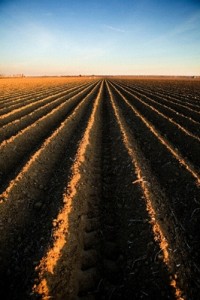 News flash! As a culture, we don’t wait well.
News flash! As a culture, we don’t wait well.
That’s why, in the previous post, I mentioned that it’s easy to get into trouble when we’re in those waiting seasons. (In theory, of course… not that I have ever actually gotten so impatient that somebody in a uniform decided it was time to have a little chat… but I’m sure you know somebody like that.)
One of the problems we have with waiting is that we don’t know how. We think of waiting as the kind of thing you do in a bureaucrat’s line or a doctor’s office (now you know why they call them “patients”).
In the Bible, James offers a different idea. And when I read this during a particularly hard waiting season, it really got my attention:
“The farmer waits for the precious produce of the soil, being patient about it, until it gets the early and late rains. You too be patient; strengthen your hearts…” (James 5:7-8).
I happen to live in the middle of the largest contiguous cotton-growing region in the world. My neighbors know a thing or two about waiting on a harvest. Their livelihood depends on it. And believe me, you won’t find a busier bunch.
I got so intrigued about this verse, and the waiting season I was in, I called one of those afore-mentioned farmers and took him to lunch. Obviously, the Lord wanted me to learn something about waiting on Him from the farmer, so I figured the best way to learn is to go straight to the source.
My first question to this man who, at last count, farms 7,000 acres: How much time in a year do you actually spend harvesting cotton?
Answer: two weeks.
Think about that. This man gets one paycheck a year, essentially. And he spends two weeks – 3.8% of his calendar – gathering up the harvest to collect it.
Draw the parallel to the thing(s) you are waiting so desperately for. I know people who spent years dreaming of their wedding day. And if it wasn’t for the photographers and cake decorators, the whole thing would be over in 15 minutes.
I have known people who waited months and years for the Lord to open opportunities to serve in a particular capacity, or to serve in a particular area. But often when the opportunities arrive, they require decisive action and quick response. And just like that, the months or years of waiting are over.
Now what?
So if the farmer only spends about 3.8% of his calendar gathering up the harvest, what does he do during the waiting season?
He is anything but idle. He is:
- Clearly defining what the harvest is.
- Plowing.
- Creating an environment where the life in the seed can be nurtured. That may require fertilizing, irrigating, or even improving the seed.
- Sowing faithfully (you can’t harvest what you don’t plant).
- Weeding carefully – removing any obstacles to fruitfulness without damaging the harvest itself.
- Then maintaining – taking care of equipment, and other types of administration.
Their harvest is determined by what they do while they’re waiting.
How does that apply to us when we’re in the waiting seasons? Let me give you a series of questions to help you think through the waiting seasons in your life:
1. What is my “harvest”? What am I waiting for?
A lot of us blow it here because we lack clarity. As clearly as possible (and in measurable terms, if you can), define exactly what it is you are waiting for.
2. Is today a “harvest day”?
If yes, then get after it! Go to the sale closing, show up to finish what you started or receive the benefits for your patience, faith, and labor.
If not, then go on….
3. What can I do to match the “seed” to the environment?
How can you “cultivate” a sale, or intimacy in your marriage? How can you make the education process more effective and efficient? How can you multiply my time, money, or energy? How can you create an environment for success?
4. How can I actually introduce the “seed” into that environment?
In the natural, this is a marketing or an initiative question. Sowing may mean making a phone call, following up a previous conversation, or some other initiative.
In the spiritual, this is a question of prayer and obedience to the promptings of the Spirit. You’re asking, “Lord, what’s my assignment for today?”
5. What potential threats do I see to the harvest, and how can I address them today?
In the natural, this may mean dealing with conflicts, or encouraging yourself. It may mean facing down the ways you self-sabotage, and getting free of that.
In the spiritual, this may mean spiritual warfare or intercessory prayer.
Regardless of the environment, just remember: you will have some “weeds” to pull.
6. What administrative things do I need to do during this waiting period?
Farmers fix tractors and equipment. They negotiate sales.
How about you? What details can you work on so that, when your harvest arrives, you’ll be ready?
When the Apollo astronauts walked on the moon for the first time, one of the things they reportedly said was, “It was just like practice.” Talk about somebody who knew what to do when they were waiting!
“Strengthen your heart,” James says. That’s what waiting is for. You’ll never see freedom – or your own harvest – without it.